Intro..
Draw...
Poems..
Clowns (Amphiprion): small fish: that
coexist with stinging anemone: and literally
wallows on its fiery tentacles: thus they avoids
the possibility of becoming foods for other fish:
for which: this seemingly soft embrace means the
deadly danger. Specific species of anemones have
their own species of clowns.
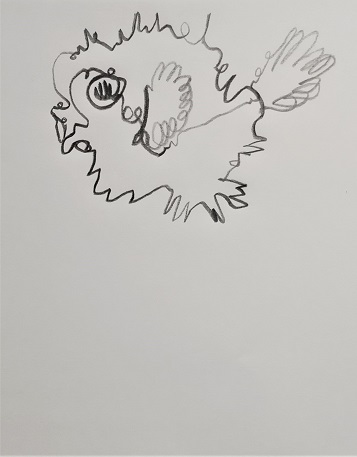 Puffer fish (Tetraodon): another small
fish. This one can swallow large amount of water:
and thus increase its volume to grow into a sphere
shape: which usually causes the attacker to scare
and sail away. By the way: puffer fish also inclu-
des Fugu: consumed in some countries for its alle-
gedly delicate taste . But this may not be true:
because the fish has a large amount of deadly
poison in its guts: that often cannot be complete-
ly removed during culinary preparation - so this
whole thing can be a snobbish adrenaline sport
only.
Puffer fish (Tetraodon): another small
fish. This one can swallow large amount of water:
and thus increase its volume to grow into a sphere
shape: which usually causes the attacker to scare
and sail away. By the way: puffer fish also inclu-
des Fugu: consumed in some countries for its alle-
gedly delicate taste . But this may not be true:
because the fish has a large amount of deadly
poison in its guts: that often cannot be complete-
ly removed during culinary preparation - so this
whole thing can be a snobbish adrenaline sport
only.
 Giant squid (Architeuthis leucas): the
largest living cephalopod: growing to length about
10 meters: and often serves as a food for the
sperm whales. As is known: the cephalopods are
armed with suction cups: distributed on the tenta-
cles - scars so large have been found on the skin
of whales: that the depths may hide squids much
larger than ten meters.
Giant squid (Architeuthis leucas): the
largest living cephalopod: growing to length about
10 meters: and often serves as a food for the
sperm whales. As is known: the cephalopods are
armed with suction cups: distributed on the tenta-
cles - scars so large have been found on the skin
of whales: that the depths may hide squids much
larger than ten meters.
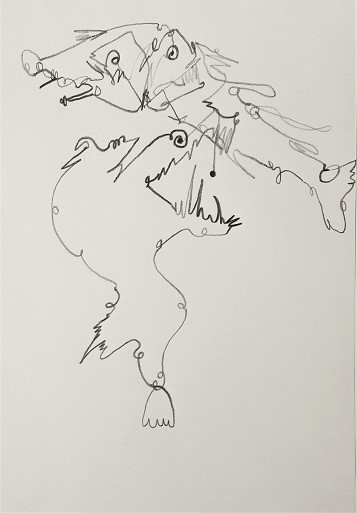 Sea devils as deep-sea fish are some-
times called: got their unflattering name probably
because of their unaesthetic appearance. The vast
majority of them are endowed with a bioluminescent
organ: that: although they live in absolute dark-
ness: is not designed to illuminate the surround-
ings. It serves to attract gullible prey. Some
devils have a long: glowing appendage on their
heads: that resembles a fishing rod: and a devil
has even been caught: that has this light directly
in its mouth. What an example of the most useful
economy!
Sea devils as deep-sea fish are some-
times called: got their unflattering name probably
because of their unaesthetic appearance. The vast
majority of them are endowed with a bioluminescent
organ: that: although they live in absolute dark-
ness: is not designed to illuminate the surround-
ings. It serves to attract gullible prey. Some
devils have a long: glowing appendage on their
heads: that resembles a fishing rod: and a devil
has even been caught: that has this light directly
in its mouth. What an example of the most useful
economy!
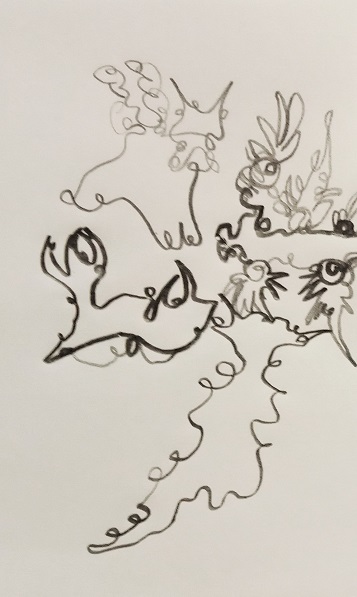 Nudibranch (Nudibranchia): or the most
beautiful slugs: that were mentioned above. They
don't have to be attractive to everyone: but they
are definitely colorful. They're quite similar
to common slugs: but they have many branching out-
growths on their bodies: with which they breathe
in water. In these external gills: they're able to
store active stinging cells derived from the ane-
mones on which they feed. Of course: the mollusks
stings if necessary. (I feel like this is familiar
to me: because when I once touched my little
classmate behind the gym: immediately the whole my
body began to burn: and especially those slaps on
my cheeks - it should was instantly clear to me -
she only had eaten too many nettles that day: be-
cause she was more than once at ease already..)
Nudibranch (Nudibranchia): or the most
beautiful slugs: that were mentioned above. They
don't have to be attractive to everyone: but they
are definitely colorful. They're quite similar
to common slugs: but they have many branching out-
growths on their bodies: with which they breathe
in water. In these external gills: they're able to
store active stinging cells derived from the ane-
mones on which they feed. Of course: the mollusks
stings if necessary. (I feel like this is familiar
to me: because when I once touched my little
classmate behind the gym: immediately the whole my
body began to burn: and especially those slaps on
my cheeks - it should was instantly clear to me -
she only had eaten too many nettles that day: be-
cause she was more than once at ease already..)
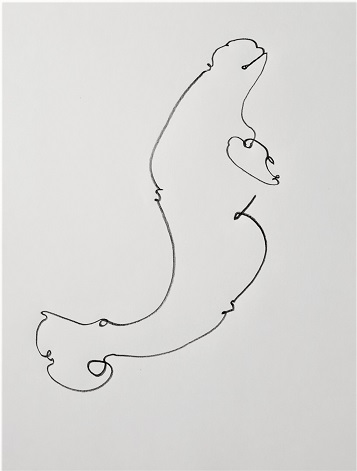 Belugas (Delphinapterus leucas): their
forty separate vocal expressions could easily be a
singing alphabet.
Belugas (Delphinapterus leucas): their
forty separate vocal expressions could easily be a
singing alphabet.
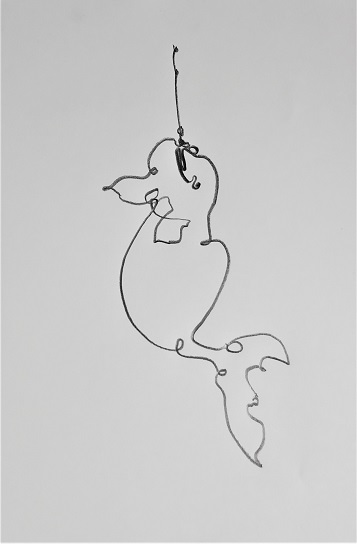 Narwhales (Monodon monoceros): their
"horn" is actually an evolutionarily transformed
incisor - giving males the ability to pierce the
ice and chivalrously invite the lady for a little
air.
Narwhales (Monodon monoceros): their
"horn" is actually an evolutionarily transformed
incisor - giving males the ability to pierce the
ice and chivalrously invite the lady for a little
air.
 Photoblepharon: the fish: that relax-
ing over a day in the depths: and at night moving
to the surface - where they attract curious food
(similarly like sea devils) with a bioluminescent
organ placed below the eyes and shaped into a
semicircle. But: using of such traps is always
dicey. It may happen: that hunter will attract so-
mething much bigger and more cunning and becomes a
prey on the contrary.
Blue whale (Balaenoptera musculus): the
largest existing animal and probably the largest
living creature of all time. The female grows to
almost thirty meters in length. Despite their size
blue whales are very peaceful: which is more or
less typical for all whale species: they even seem
to collectively suffer from some kind of strange
depression: which sometimes drives them to shallow
beaches - where they then persistently try to com-
mit suicide. Perhaps this is related to their
enlarged brain and high intelligence: which always
signals that trouble is coming: or they are trying
to escape from the mess we have caused them there.
Photoblepharon: the fish: that relax-
ing over a day in the depths: and at night moving
to the surface - where they attract curious food
(similarly like sea devils) with a bioluminescent
organ placed below the eyes and shaped into a
semicircle. But: using of such traps is always
dicey. It may happen: that hunter will attract so-
mething much bigger and more cunning and becomes a
prey on the contrary.
Blue whale (Balaenoptera musculus): the
largest existing animal and probably the largest
living creature of all time. The female grows to
almost thirty meters in length. Despite their size
blue whales are very peaceful: which is more or
less typical for all whale species: they even seem
to collectively suffer from some kind of strange
depression: which sometimes drives them to shallow
beaches - where they then persistently try to com-
mit suicide. Perhaps this is related to their
enlarged brain and high intelligence: which always
signals that trouble is coming: or they are trying
to escape from the mess we have caused them there.
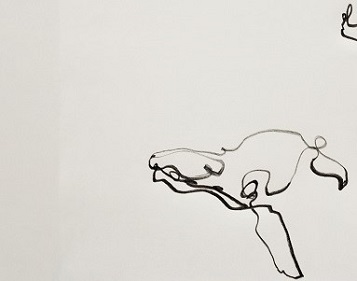 Humpback whale (Megaptera
novaeangliae): This seafarer lurks for huge
schools of small fish by swimming underneath them
and blowing billions bubbles from its mouth: until
they become a huge transparent net: in which the
whole silver cloud is caught at once. It is cer-
tainly quite mysterious: why fish do not swim out
of bubbles: although they can do it easily: at any
moment. (This reminds me of a girl with whom seve-
ral of us students were once fatally in love at
school - because her words: laughter: and every-
thing she said floated around her like pink
bubbles - and we fools: we were all lost in that
cloud of champagne like those poor fish. And the
fact: that she put her hand over her face whenever
she laughed – that was also very incriminating –
because it is said: that polar bears do the same
thing: when they are lying in wait for prey – they
cover their black nose with their paw: so that it
does not disclose them – because otherwise: as is
known: they are all white.)
Humpback whale (Megaptera
novaeangliae): This seafarer lurks for huge
schools of small fish by swimming underneath them
and blowing billions bubbles from its mouth: until
they become a huge transparent net: in which the
whole silver cloud is caught at once. It is cer-
tainly quite mysterious: why fish do not swim out
of bubbles: although they can do it easily: at any
moment. (This reminds me of a girl with whom seve-
ral of us students were once fatally in love at
school - because her words: laughter: and every-
thing she said floated around her like pink
bubbles - and we fools: we were all lost in that
cloud of champagne like those poor fish. And the
fact: that she put her hand over her face whenever
she laughed – that was also very incriminating –
because it is said: that polar bears do the same
thing: when they are lying in wait for prey – they
cover their black nose with their paw: so that it
does not disclose them – because otherwise: as is
known: they are all white.)
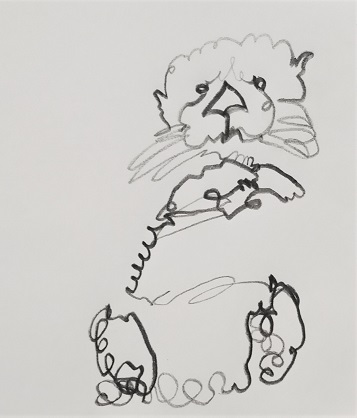 Sea otter (Enhydra lutris): Although
it belongs to a small and sometimes quite privile-
ged group of creatures that can use tools: it has
really beautiful fur: so it is almost extinct. It
practically never leaves the sea: not even when
it sleeps and gives birth to its young. Its
everyday instrument is a set of two stones. One
is a worktop: that it places on its stomach: and
the other is a hammer for breaking up unwieldy
packaged food. Land otters are said to make a
slide from mud and spend days just frolicking on
it.
Sea otter (Enhydra lutris): Although
it belongs to a small and sometimes quite privile-
ged group of creatures that can use tools: it has
really beautiful fur: so it is almost extinct. It
practically never leaves the sea: not even when
it sleeps and gives birth to its young. Its
everyday instrument is a set of two stones. One
is a worktop: that it places on its stomach: and
the other is a hammer for breaking up unwieldy
packaged food. Land otters are said to make a
slide from mud and spend days just frolicking on
it.
 Pipefishes (Syngnathidae): Fish
belonging to the same family as seahorses. All
species of this family are characterized by their
peculiar body shape. This gives them the privile-
ge of disappearing among the seaweed and thus not
being in sight of those: who might be interested
in their flesh.
Marbled electric ray (Torpedo
marmorata): Primitive fish that: like the eel
(Electrophorus electricus): has a built-in device
for generating electricity in its body - thereby
depriving its future prey of consciousness. All
rays have a flat body shape: so they are immedia-
tely after killing - suitable for placing by the
bed as trophies: or can be used: due to their pra-
ctical rough skin: as doormats.
Pipefishes (Syngnathidae): Fish
belonging to the same family as seahorses. All
species of this family are characterized by their
peculiar body shape. This gives them the privile-
ge of disappearing among the seaweed and thus not
being in sight of those: who might be interested
in their flesh.
Marbled electric ray (Torpedo
marmorata): Primitive fish that: like the eel
(Electrophorus electricus): has a built-in device
for generating electricity in its body - thereby
depriving its future prey of consciousness. All
rays have a flat body shape: so they are immedia-
tely after killing - suitable for placing by the
bed as trophies: or can be used: due to their pra-
ctical rough skin: as doormats.
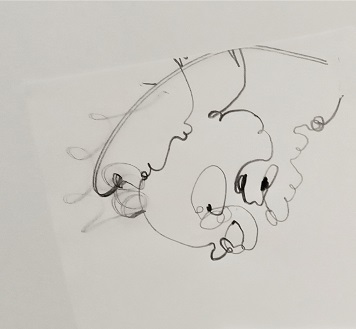 Flounders (Pleuronectidae) Fish:
that are symmetrical and normally spindle-shaped
for a while after hatching. Later: however: they
begin to "lay" on their left side and undergo the
aforementioned morphological changes - so that
adults have only the upper part of their flattened
body colored - while the lower part is mostly whi-
te. They can adapt the color of the upper part to
the bottom on which they are resting.
Flounders (Pleuronectidae) Fish:
that are symmetrical and normally spindle-shaped
for a while after hatching. Later: however: they
begin to "lay" on their left side and undergo the
aforementioned morphological changes - so that
adults have only the upper part of their flattened
body colored - while the lower part is mostly whi-
te. They can adapt the color of the upper part to
the bottom on which they are resting.
 Sargasso Sea Strange place in
Atlantic Ocean. Huge colonies of algae float there
- in which entire communities of unique creatures
are hidden. Some hide so as not to be found:
others so as not to be seen: and some simply dis-
appear. This is mainly done by eels: which travel
here from the inland for many months and mate he-
re. Perhaps these tiny snakes do this only so that
they can evaporate even more ostentatiously after
their return. By the way: the Sargasso Sea is
adjacent to the Bermuda archipelago.
Cuttlefish famous mollusk: that can
instantly change the colors and patterns of its
skin. This way it can blend in with its surround-
ings and also express its ongoing moods. In
danger: it has the advantage of magical disappear-
ing: it can do this even: when it simply wants to
be alone: and that's still not all - it can also
disappear from intruders in a cloud of ink: and on
top of that: it possesses its personal jet engine
(a tubular organ at the base of its tentacles)
which can launch it away in reverse in an instant
anytime. (All introverts will agree with me: that
this can only be called the dream gear.)
Sargasso Sea Strange place in
Atlantic Ocean. Huge colonies of algae float there
- in which entire communities of unique creatures
are hidden. Some hide so as not to be found:
others so as not to be seen: and some simply dis-
appear. This is mainly done by eels: which travel
here from the inland for many months and mate he-
re. Perhaps these tiny snakes do this only so that
they can evaporate even more ostentatiously after
their return. By the way: the Sargasso Sea is
adjacent to the Bermuda archipelago.
Cuttlefish famous mollusk: that can
instantly change the colors and patterns of its
skin. This way it can blend in with its surround-
ings and also express its ongoing moods. In
danger: it has the advantage of magical disappear-
ing: it can do this even: when it simply wants to
be alone: and that's still not all - it can also
disappear from intruders in a cloud of ink: and on
top of that: it possesses its personal jet engine
(a tubular organ at the base of its tentacles)
which can launch it away in reverse in an instant
anytime. (All introverts will agree with me: that
this can only be called the dream gear.)
 Latimeria The only living
representative of the lobe-finned fish. It shows
an annoying reluctance to cooperate: when being
taxidermied - because its sky-blue color turns to
an offensive gray shortly after being lifted out
of the water. (According to recent research: there
are several species of such fish: but their reluc-
tance to be taxidermied continues.)
Back...
Along..
More...
Latimeria The only living
representative of the lobe-finned fish. It shows
an annoying reluctance to cooperate: when being
taxidermied - because its sky-blue color turns to
an offensive gray shortly after being lifted out
of the water. (According to recent research: there
are several species of such fish: but their reluc-
tance to be taxidermied continues.)
Back...
Along..
More...
 Puffer fish (Tetraodon): another small
fish. This one can swallow large amount of water:
and thus increase its volume to grow into a sphere
shape: which usually causes the attacker to scare
and sail away. By the way: puffer fish also inclu-
des Fugu: consumed in some countries for its alle-
gedly delicate taste . But this may not be true:
because the fish has a large amount of deadly
poison in its guts: that often cannot be complete-
ly removed during culinary preparation - so this
whole thing can be a snobbish adrenaline sport
only.
Puffer fish (Tetraodon): another small
fish. This one can swallow large amount of water:
and thus increase its volume to grow into a sphere
shape: which usually causes the attacker to scare
and sail away. By the way: puffer fish also inclu-
des Fugu: consumed in some countries for its alle-
gedly delicate taste . But this may not be true:
because the fish has a large amount of deadly
poison in its guts: that often cannot be complete-
ly removed during culinary preparation - so this
whole thing can be a snobbish adrenaline sport
only.
 Giant squid (Architeuthis leucas): the
largest living cephalopod: growing to length about
10 meters: and often serves as a food for the
sperm whales. As is known: the cephalopods are
armed with suction cups: distributed on the tenta-
cles - scars so large have been found on the skin
of whales: that the depths may hide squids much
larger than ten meters.
Giant squid (Architeuthis leucas): the
largest living cephalopod: growing to length about
10 meters: and often serves as a food for the
sperm whales. As is known: the cephalopods are
armed with suction cups: distributed on the tenta-
cles - scars so large have been found on the skin
of whales: that the depths may hide squids much
larger than ten meters.
 Sea devils as deep-sea fish are some-
times called: got their unflattering name probably
because of their unaesthetic appearance. The vast
majority of them are endowed with a bioluminescent
organ: that: although they live in absolute dark-
ness: is not designed to illuminate the surround-
ings. It serves to attract gullible prey. Some
devils have a long: glowing appendage on their
heads: that resembles a fishing rod: and a devil
has even been caught: that has this light directly
in its mouth. What an example of the most useful
economy!
Sea devils as deep-sea fish are some-
times called: got their unflattering name probably
because of their unaesthetic appearance. The vast
majority of them are endowed with a bioluminescent
organ: that: although they live in absolute dark-
ness: is not designed to illuminate the surround-
ings. It serves to attract gullible prey. Some
devils have a long: glowing appendage on their
heads: that resembles a fishing rod: and a devil
has even been caught: that has this light directly
in its mouth. What an example of the most useful
economy!
 Nudibranch (Nudibranchia): or the most
beautiful slugs: that were mentioned above. They
don't have to be attractive to everyone: but they
are definitely colorful. They're quite similar
to common slugs: but they have many branching out-
growths on their bodies: with which they breathe
in water. In these external gills: they're able to
store active stinging cells derived from the ane-
mones on which they feed. Of course: the mollusks
stings if necessary. (I feel like this is familiar
to me: because when I once touched my little
classmate behind the gym: immediately the whole my
body began to burn: and especially those slaps on
my cheeks - it should was instantly clear to me -
she only had eaten too many nettles that day: be-
cause she was more than once at ease already..)
Nudibranch (Nudibranchia): or the most
beautiful slugs: that were mentioned above. They
don't have to be attractive to everyone: but they
are definitely colorful. They're quite similar
to common slugs: but they have many branching out-
growths on their bodies: with which they breathe
in water. In these external gills: they're able to
store active stinging cells derived from the ane-
mones on which they feed. Of course: the mollusks
stings if necessary. (I feel like this is familiar
to me: because when I once touched my little
classmate behind the gym: immediately the whole my
body began to burn: and especially those slaps on
my cheeks - it should was instantly clear to me -
she only had eaten too many nettles that day: be-
cause she was more than once at ease already..)
 Belugas (Delphinapterus leucas): their
forty separate vocal expressions could easily be a
singing alphabet.
Belugas (Delphinapterus leucas): their
forty separate vocal expressions could easily be a
singing alphabet.
 Narwhales (Monodon monoceros): their
"horn" is actually an evolutionarily transformed
incisor - giving males the ability to pierce the
ice and chivalrously invite the lady for a little
air.
Narwhales (Monodon monoceros): their
"horn" is actually an evolutionarily transformed
incisor - giving males the ability to pierce the
ice and chivalrously invite the lady for a little
air.
 Photoblepharon: the fish: that relax-
ing over a day in the depths: and at night moving
to the surface - where they attract curious food
(similarly like sea devils) with a bioluminescent
organ placed below the eyes and shaped into a
semicircle. But: using of such traps is always
dicey. It may happen: that hunter will attract so-
mething much bigger and more cunning and becomes a
prey on the contrary.
Blue whale (Balaenoptera musculus): the
largest existing animal and probably the largest
living creature of all time. The female grows to
almost thirty meters in length. Despite their size
blue whales are very peaceful: which is more or
less typical for all whale species: they even seem
to collectively suffer from some kind of strange
depression: which sometimes drives them to shallow
beaches - where they then persistently try to com-
mit suicide. Perhaps this is related to their
enlarged brain and high intelligence: which always
signals that trouble is coming: or they are trying
to escape from the mess we have caused them there.
Photoblepharon: the fish: that relax-
ing over a day in the depths: and at night moving
to the surface - where they attract curious food
(similarly like sea devils) with a bioluminescent
organ placed below the eyes and shaped into a
semicircle. But: using of such traps is always
dicey. It may happen: that hunter will attract so-
mething much bigger and more cunning and becomes a
prey on the contrary.
Blue whale (Balaenoptera musculus): the
largest existing animal and probably the largest
living creature of all time. The female grows to
almost thirty meters in length. Despite their size
blue whales are very peaceful: which is more or
less typical for all whale species: they even seem
to collectively suffer from some kind of strange
depression: which sometimes drives them to shallow
beaches - where they then persistently try to com-
mit suicide. Perhaps this is related to their
enlarged brain and high intelligence: which always
signals that trouble is coming: or they are trying
to escape from the mess we have caused them there.
 Humpback whale (Megaptera
novaeangliae): This seafarer lurks for huge
schools of small fish by swimming underneath them
and blowing billions bubbles from its mouth: until
they become a huge transparent net: in which the
whole silver cloud is caught at once. It is cer-
tainly quite mysterious: why fish do not swim out
of bubbles: although they can do it easily: at any
moment. (This reminds me of a girl with whom seve-
ral of us students were once fatally in love at
school - because her words: laughter: and every-
thing she said floated around her like pink
bubbles - and we fools: we were all lost in that
cloud of champagne like those poor fish. And the
fact: that she put her hand over her face whenever
she laughed – that was also very incriminating –
because it is said: that polar bears do the same
thing: when they are lying in wait for prey – they
cover their black nose with their paw: so that it
does not disclose them – because otherwise: as is
known: they are all white.)
Humpback whale (Megaptera
novaeangliae): This seafarer lurks for huge
schools of small fish by swimming underneath them
and blowing billions bubbles from its mouth: until
they become a huge transparent net: in which the
whole silver cloud is caught at once. It is cer-
tainly quite mysterious: why fish do not swim out
of bubbles: although they can do it easily: at any
moment. (This reminds me of a girl with whom seve-
ral of us students were once fatally in love at
school - because her words: laughter: and every-
thing she said floated around her like pink
bubbles - and we fools: we were all lost in that
cloud of champagne like those poor fish. And the
fact: that she put her hand over her face whenever
she laughed – that was also very incriminating –
because it is said: that polar bears do the same
thing: when they are lying in wait for prey – they
cover their black nose with their paw: so that it
does not disclose them – because otherwise: as is
known: they are all white.)
 Sea otter (Enhydra lutris): Although
it belongs to a small and sometimes quite privile-
ged group of creatures that can use tools: it has
really beautiful fur: so it is almost extinct. It
practically never leaves the sea: not even when
it sleeps and gives birth to its young. Its
everyday instrument is a set of two stones. One
is a worktop: that it places on its stomach: and
the other is a hammer for breaking up unwieldy
packaged food. Land otters are said to make a
slide from mud and spend days just frolicking on
it.
Sea otter (Enhydra lutris): Although
it belongs to a small and sometimes quite privile-
ged group of creatures that can use tools: it has
really beautiful fur: so it is almost extinct. It
practically never leaves the sea: not even when
it sleeps and gives birth to its young. Its
everyday instrument is a set of two stones. One
is a worktop: that it places on its stomach: and
the other is a hammer for breaking up unwieldy
packaged food. Land otters are said to make a
slide from mud and spend days just frolicking on
it.
 Pipefishes (Syngnathidae): Fish
belonging to the same family as seahorses. All
species of this family are characterized by their
peculiar body shape. This gives them the privile-
ge of disappearing among the seaweed and thus not
being in sight of those: who might be interested
in their flesh.
Marbled electric ray (Torpedo
marmorata): Primitive fish that: like the eel
(Electrophorus electricus): has a built-in device
for generating electricity in its body - thereby
depriving its future prey of consciousness. All
rays have a flat body shape: so they are immedia-
tely after killing - suitable for placing by the
bed as trophies: or can be used: due to their pra-
ctical rough skin: as doormats.
Pipefishes (Syngnathidae): Fish
belonging to the same family as seahorses. All
species of this family are characterized by their
peculiar body shape. This gives them the privile-
ge of disappearing among the seaweed and thus not
being in sight of those: who might be interested
in their flesh.
Marbled electric ray (Torpedo
marmorata): Primitive fish that: like the eel
(Electrophorus electricus): has a built-in device
for generating electricity in its body - thereby
depriving its future prey of consciousness. All
rays have a flat body shape: so they are immedia-
tely after killing - suitable for placing by the
bed as trophies: or can be used: due to their pra-
ctical rough skin: as doormats.
 Flounders (Pleuronectidae) Fish:
that are symmetrical and normally spindle-shaped
for a while after hatching. Later: however: they
begin to "lay" on their left side and undergo the
aforementioned morphological changes - so that
adults have only the upper part of their flattened
body colored - while the lower part is mostly whi-
te. They can adapt the color of the upper part to
the bottom on which they are resting.
Flounders (Pleuronectidae) Fish:
that are symmetrical and normally spindle-shaped
for a while after hatching. Later: however: they
begin to "lay" on their left side and undergo the
aforementioned morphological changes - so that
adults have only the upper part of their flattened
body colored - while the lower part is mostly whi-
te. They can adapt the color of the upper part to
the bottom on which they are resting.
 Sargasso Sea Strange place in
Atlantic Ocean. Huge colonies of algae float there
- in which entire communities of unique creatures
are hidden. Some hide so as not to be found:
others so as not to be seen: and some simply dis-
appear. This is mainly done by eels: which travel
here from the inland for many months and mate he-
re. Perhaps these tiny snakes do this only so that
they can evaporate even more ostentatiously after
their return. By the way: the Sargasso Sea is
adjacent to the Bermuda archipelago.
Cuttlefish famous mollusk: that can
instantly change the colors and patterns of its
skin. This way it can blend in with its surround-
ings and also express its ongoing moods. In
danger: it has the advantage of magical disappear-
ing: it can do this even: when it simply wants to
be alone: and that's still not all - it can also
disappear from intruders in a cloud of ink: and on
top of that: it possesses its personal jet engine
(a tubular organ at the base of its tentacles)
which can launch it away in reverse in an instant
anytime. (All introverts will agree with me: that
this can only be called the dream gear.)
Sargasso Sea Strange place in
Atlantic Ocean. Huge colonies of algae float there
- in which entire communities of unique creatures
are hidden. Some hide so as not to be found:
others so as not to be seen: and some simply dis-
appear. This is mainly done by eels: which travel
here from the inland for many months and mate he-
re. Perhaps these tiny snakes do this only so that
they can evaporate even more ostentatiously after
their return. By the way: the Sargasso Sea is
adjacent to the Bermuda archipelago.
Cuttlefish famous mollusk: that can
instantly change the colors and patterns of its
skin. This way it can blend in with its surround-
ings and also express its ongoing moods. In
danger: it has the advantage of magical disappear-
ing: it can do this even: when it simply wants to
be alone: and that's still not all - it can also
disappear from intruders in a cloud of ink: and on
top of that: it possesses its personal jet engine
(a tubular organ at the base of its tentacles)
which can launch it away in reverse in an instant
anytime. (All introverts will agree with me: that
this can only be called the dream gear.)
 Latimeria The only living
representative of the lobe-finned fish. It shows
an annoying reluctance to cooperate: when being
taxidermied - because its sky-blue color turns to
an offensive gray shortly after being lifted out
of the water. (According to recent research: there
are several species of such fish: but their reluc-
tance to be taxidermied continues.)
Back...
Along..
More...
Latimeria The only living
representative of the lobe-finned fish. It shows
an annoying reluctance to cooperate: when being
taxidermied - because its sky-blue color turns to
an offensive gray shortly after being lifted out
of the water. (According to recent research: there
are several species of such fish: but their reluc-
tance to be taxidermied continues.)
Back...
Along..
More...